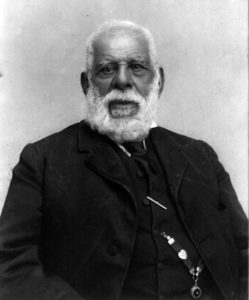
Pio Pico
This date marks the birth of Pio de Jesus Pico, an Afro Mexican businessman and politician, in 1801.
Pico was born in the San Gabriel Mission in Mexico, the son of a soldier, Jose Maria Pico. His father had come from Mexico north with the Anza expedition of 1801. The fourth of ten children, Pico's heritage was an indigenous mix of African, Native American, Hispanic, and European roots. A revolutionary in his youth, he was the last Mexican governor of Alta California (now the state of California), the region above what is now Mexico.
Pico became governor in 1845 following a revolt that ended with a bloodless artillery duel near Cahuenga Pass that forced out Governor Manuel Micheltorena. The state historic site, Campo de Cah enga, opposite Universal Studios, marks today's location. During his brief tenure as the last Mexican governor, Pico completed the secularization of the missions. He was accused of irresponsibly sorti g out mission property to friends and allies as the American takeover of California neared. Pico greatly feared the growing Ameri and migration to California. "They are cultivating farms, establishing vineyards, erecting mills, sawing up the lumber, building workshops, and doing a thousand other things which seem natural to them but which Californians neglect or despise," he said in a speech.
Pico favored annexation with France or England, believing the European powers would be more tolerant of the slower California way of life. In 1846, with American troops occupying Los Angeles (which Pico had made the state capital) and San Diego, Pico bowed to the inevitable and escaped to Mexico. Two years later, with California, a territory of the United States, he returned home as a private citizen. In 1854, he built his Rancito home in what is now Whittier, California, and became a businessman and an early member of the Los Angeles City Council. Over the years, gambling losses took a heavy toll on Pico's fortune. He eventually sold his last central holing, a ranch in the San Fernando Valley, and built Pico House, a deluxe downtown hotel that was the largest of its day. He ultimately lost the hotel, too.
Living off the charity of friends, he died in poverty in Los Angeles in 1894 at his daughter Joaquina Pico Moreno's home and was buried in a pauper's grave. The Pico House, located on the Plaza cross from Olvera Street, which he called El Ranchito, still stands in Whittier, CA. It has been restored and is on the National Register of Historic Places. Pico Boulevard, a prominent Los Angeles thoroughfare, bears the governor's name.
The Black West by William Loren Katz.
A Touchstone Book, published by Simon & Shuster Inc.
Copyright 1987, 1996 by Ethrac Publications, Inc.
ISBN 0-684-81478-1